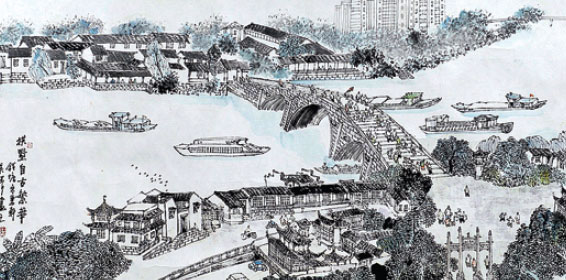Artist draws on rich past, folklore of Grand Canal
Updated: 2015-03-03 07:54
By Qu Yingpu and Yan Yiqi in Hangzhou(China Daily USA)
|
||||||||
Traditional paintings supported successful application to become a World Heritage Site
If anyone is called upon to demonstrate the culture and folklore associated with the Hangzhou section of the Grand Canal, Wu Liren should be at the top of the list.
Wu, born in 1957, has lived alongside this section of the Grand Canal for nearly 60 years. He is an artist and produces traditional Chinese paintings, which have depicted scenes of canal for more than 30 years.
"There are so many stories to tell about the canal," he said. "I use my brush pen to draw them so that people all over the world can get to know them."
His paintings capture people, folklore and traditional activities along the canal, giving the viewer a clear picture of the canal and activities associated with it in bygone days.
His paintings formed part of the canal's application in 2007 to become a World Heritage Site. Wu spent more than a year traveling along the canal and gaining inspiration for his folklore paintings. He published a book that formed part of the material submitted to support the application.
The 1,794-kilometer canal, the longest and oldest artificial waterway in the world, was recognized by the UNESCO last summer as a World Heritage Site.
"As a man who grew up along the canal, and who has the ability to tell its stories with my paintings, I think it is my obligation to contribute, if only in a small way, to the protection and development of the Grand Canal," he said.
Wu said his interest in painting canal scenes stems partly from his childhood roots and personal feelings toward the canal, but mainly from how he witnessed the canal's neglect.
"When I was a child, the water in the canal was clear, and every summer was spent swimming and fishing in the canal," he said.
In the 1970s, pollution began to take its toll. The water became dirty and smelly, a situation that continued until the late 1990s, when the government began to take protective measures.
"During the worst time in the early 1990s, there was a saying in Hangzhou that it did not matter if someone lost their way to the canal because the smell would lead them to it. That worried me a lot," he said.
As early as the 1970s, he decided to use his paintings to make people aware of the need to protect the canal, which runs from Beijing to Hangzhou.
"My initial thought was that by seeing my paintings, people would realize how many wonderful things had been destroyed and start to think about protecting the remaining ones," he said.
Wu is glad the canal's water is once again clear, even though he can no longer go for a swim because of the restrictions.
But he is pleased with the response to his efforts, which have culminated in the Hangzhou-section of the Grand Canal becoming the cultural center of the city, with five museums, art groups and cultural industry parks.
Wu's favorite activity is to ride his bicycle along the banks of the canal.
Zhao Yixin, chairman of the Hangzhou History Association, said that he has never seen a person more devoted to presenting the culture of the Grand Canal than Wu.
"I would say his whole lifetime has been focused on this subject," Zhao said. "And due to his efforts, we get to know the old traditions of the city and the canal."
Wu has a workshop in an exhibition hall of the Beijing-Hangzhou Grand Canal Museum in Hangzhou.
If he was not continually invited to attend conferences, he would spend all of his time painting there or giving free lessons to children.
Wu's next project is to publish a book of paintings depicting the buildings that once stood along the canal but have since been demolished. He hopes to publish the book in 2017.
"These old buildings are all in my mind," he said. "Maybe one day, someone can rebuild them according to my paintings."
Contact the writers at yanyiqi@chinadaily.com.cn
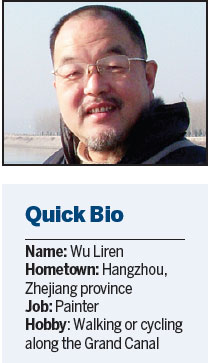
|
Wu Liren (below) and one of his works depicting a scene of the Grand Canal in ancient times. Provided to China Daily |
(China Daily USA 03/03/2015 page7)
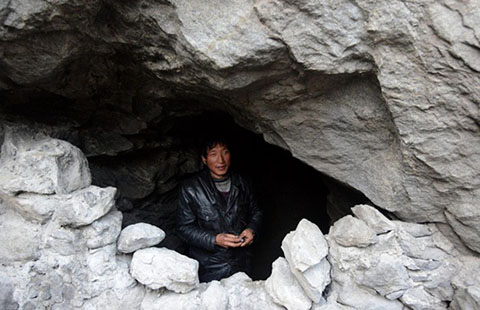
 Caveman saves money for family
Caveman saves money for family
 China's interest rate adjustments beteen 2008 and 2015
China's interest rate adjustments beteen 2008 and 2015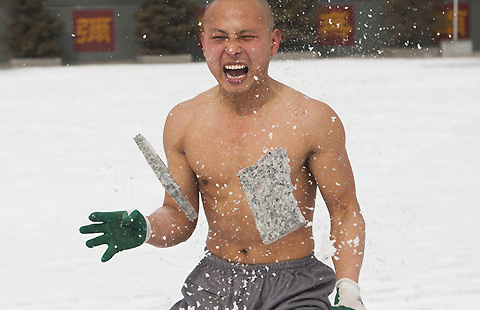
 Buddhist monks break bricks in kung fu
Buddhist monks break bricks in kung fu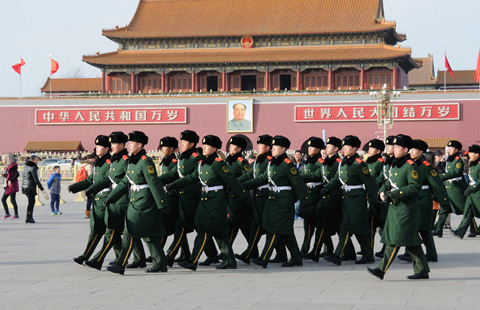
 Beijing steps up security for two sessions
Beijing steps up security for two sessions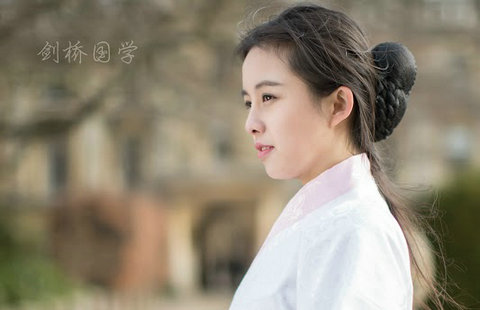
 Han-style Chinese beauties at Cambridge
Han-style Chinese beauties at Cambridge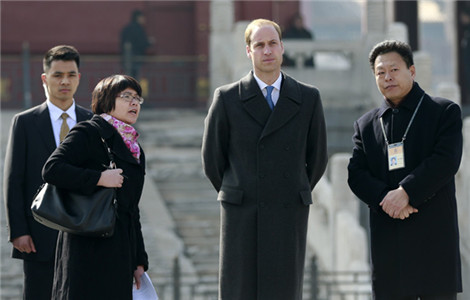
 Prince William visits Forbidden City
Prince William visits Forbidden City
 Aerial views of plum blossoms as beautiful as oil paintings
Aerial views of plum blossoms as beautiful as oil paintings
 Visitors enjoy cherry blossom in a park in SW China's Yunnan
Visitors enjoy cherry blossom in a park in SW China's Yunnan
Most Viewed
Editor's Picks

|

|

|

|

|

|
Today's Top News
Air pollution tops public concerns for two sessions
Wanda's Wang tops China's rich list
US businesses to lower 2015 reinvestments in China
Hilary Clinton may have broken federal laws - reports
US policy focused on Asia: official
China more proactive at UN
Cooperation potential called 'limitless'
Homeland Security funding drama darkens US fiscal outlook
US Weekly

|

|
